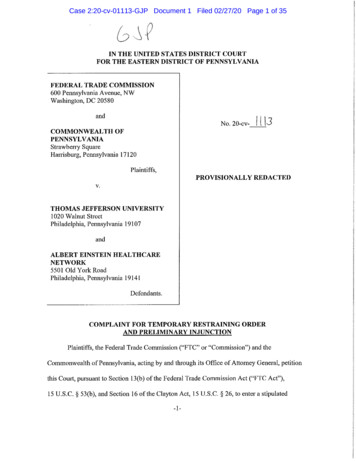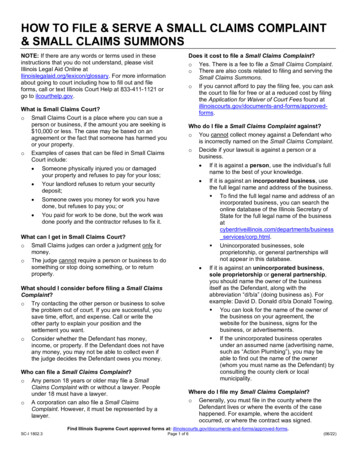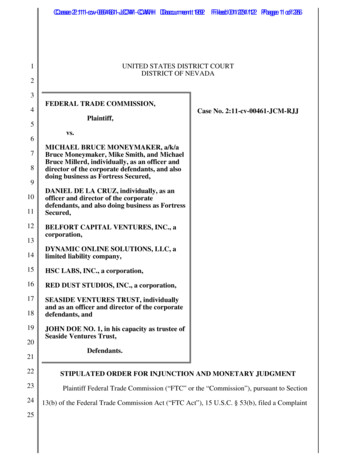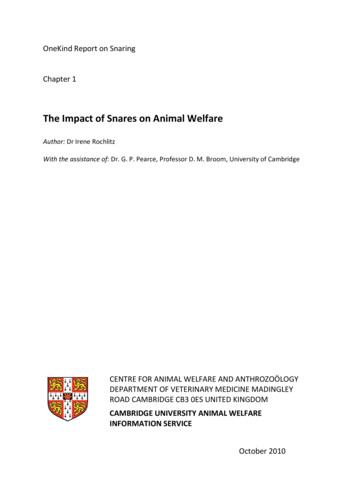
Transcription
Case 2:20-cv-01113-GJP Document 1 Filed 02/27/20 Page 1 of 35IN THE UNITED STATES DISTRICT COURTFOR THE EASTERN DISTRICT OF PENNSYLVANIAFEDERAL TRADE COMMISSION600 Pennsylvania Avenue, NWWashington, DC 20580andNo. 20-cv-I [ IJCOMMONWEALTH OFPENNSYLVANIAStrawberry SquareHarrisburg, Pennsylvania 17120Plaintiffs,PROVISIONALLY REDACTEDV.THOMAS JEFFERSON UNIVERSITY1020 Walnut StreetPhiladelphia, Pennsylvania 19107andALBERT EINSTEIN HEALTHCARENETWORK5501 Old York RoadPhiladelphia, Pennsylvania 1914 lDefendants.COMPLAINT FOR TEMPORARY RESTRAINING ORDERAND PRELIMINARY INJUNCTIONPlaintiffs, the Federal Trade Conunission ("FTC" or "Commission") and theCommonwealth of Pennsylvania, acting by and through its Office of Attorney General, petitionthis Court, pursuant to Section 13(b) of the Federal Trade Commission Act ("FTC Act"),15 U.S.C. § 53(b), and Section 16 of the Clayton Act, 15 U.S.C. § 26, to enter a stipulated-1-
Case 2:20-cv-01113-GJP Document 1 Filed 02/27/20 Page 2 of 35temporary restraining order and grant a preliminary injunction enjoining Defendant ThomasJefferson University ("Jefferson") and Defendant Albeit Einstein Healthcare Network("Einstein," and together with Jefferson, "Defendants"), including their agents, divisions,parents, subsidiaries, affiliates, partnerships, or joint ventures, from consummating theirproposed merger. Jefferson and Einstein entered a System Integration Agreement datedSeptember 14, 2018 ("Integration Agreement"), whereby Jefferson will become the sole memberof Einstein and the ultimate parent entity of Einstein (the "Transaction"). Absent this Court'saction, Defendants will be free to complete the Transaction on or after 11 :59 p.m. EST onFebruary 28, 2020.Plaintiffs require the aid of this Court to maintain the status quo and prevent interim harmto competition during the pendency of an administrative trial on the merits. The Commission hasalready initiated the administrative proceeding pursuant to Sections 7 and 11 of the Clayton Act,15 U.S.C. §§ 18, 21, and Section 5 of the FTC Act, 15 U.S.C. § 45. The Commission filed itsadministrative complaint on February 27, 2020. Pursuant to FTC regulations, the administrativetrial on the merits will begin on September I, 2020. The administrative trial will determine thelegality of the Transaction and will provide all paities a full opportunity to conduct discoveryand present testimony and other evidence regarding the likely competitive effects of theTransaction.I.NATURE OF THE CASEI.The FTC and the Commonwealth of Pennsylvania ask this Court to enjoinpreliminarily the anticompetitive merger between Jefferson and Einstein. Jefferson and Einsteinare two of the leading providers of inpatient general acute care ("GAC") hospital services and-2-
Case 2:20-cv-01113-GJP Document 1 Filed 02/27/20 Page 3 of 35inpatient acute rehabilitation services in Philadelphia and Montgomery Counties. The proposedTransaction would combine the Jefferson and Einstein systems to create the largest hospitalsystem in Philadelphia County and by far the largest hospital system in Montgome1y County andin the greater Philadelphia region.2.Einstein and Jefferson hospitals offer a broad range of medical and surgicaldiagnostic and treatment services that require an overnight hospital stay. Today, Defendantscompete to sell these inpatient GAC hospital services to co111111ercial insurers and to provideinpatient GAC hospital services to those insurers' members.3.Einstein operates GAC hospitals that compete directly and significantly withJefferson's GAC hospitals. Located in North Philadelphia, Einstein's flagship hospital, EinsteinMedical Center Philadelphia ("EMCP"), significantly competes with Jefferson's AbingtonHospital ("Abington"), located in eastern Montgome1y County, and Jefferson FrankfordHospital, located in n011heast Philadelphia. Einstein Medical Center Elkins Park ("EMCEP"), aGAC hospital inside a larger inpatient rehabilitation facility in eastern Montgomery County,likewise significantly competes with Jefferson's Abington Hospital and Jefferson FrankfordHospital. In Montgome1y County, Einstein Medical Center Montgomery ("EMCM")significantly competes with both Jefferson's Abington Hospital and Jefferson's Abington Lansdale Hospital ("Lansdale"). The relevant geographic markets to assess the competitiveimpact of the Transaction include GAC hospitals in the area around EMCP in North Philadelphia(the "N011hern Philadelphia Area") and GAC hospitals in the area around EMCM inMontgomery County (the "Montgomery Area").4.Jefferson and Einstein are close competitors for inpatient GAC hospital services.-3-
Case 2:20-cv-01113-GJP Document 1 Filed 02/27/20 Page 4 of 355.Post-Transaction, Defendants would control at least 60% of the inpatient GAChospital services market, as measured by conunercially insured patient admissions in theNmihern Philadelphia Area, with only one other hospital system providing inpatient GAChospital services with any meaningful presence. Post-Transaction, Defendants also wouldbecome the market leader in the Montgomery Area, controlling at least 45% of the inpatientGAC hospital services market, as measured by conunercially insured patient admissions, in theMontgome1y Area.6.The U.S. antitrnst enforcement agencies promulgated the 2010 U.S. Depmimentof Justice and Federal Trade Commission Horizontal Merger Guidelines ("Merger Guidelines")to "assist the courts in developing an appropriate framework for inte1preting and applying theantitrnst laws." Under the Merger Guidelines, a post-acquisition market concentration levelabove 2,500 points, as measured by the Herfrndahl-Hirschman Index ("HHI"), and an increase inmarket concentration of more than 200 points renders an acquisition presumptively unlawful.Based on connnercially insured patient admissions, the Transaction would significantly increaseconcentration in already highly concentrated markets for inpatient GAC hospital services, wellbeyond the tlll'esholds set fmih in the Merger Guidelines. Thus, under the Merger Guidelines,-4-
Case 2:20-cv-01113-GJP Document 1 Filed 02/27/20 Page 5 of 35the Transaction is presumptively unlawful in the inpatient GAC hospital services product marketin both the Northern Philadelphia Area and the Montgome1y Area.7.In addition to providing inpatient GAC hospital services, Defendants also operatenationally renowned inpatient rehabilitation facilities ("IRFs") that compete against each othertoday. Einstein operates several IRFs under the name MossRehab ("Moss") throughout thegreater Philadelphia region, and Jefferson operates Magee Rehabilitation Hospital ("Magee") inthe Center City neighborhood of Philadelphia and two other IRFs in the greater Philadelphiaregion.8.Einstein and Jefferson IRFs provide advanced post-acute rehabilitation care forpatients treated at GAC hospitals for conditions such as stroke, traumatic brain injury, or spinalcord injury. IRFs provide such inpatient acute rehabilitation services to only those patients whocan withstand and benefit from them. The relevant geographic market in which to analyze theeffects of the Transaction for inpatient acute rehabilitation services is the area around Einstein'sMoss at Elkins Park (the "Philadelphia Area"). Together, Defendants operate six of the eightIRFs in the Philadelphia Area.9.Both Einstein and Jefferson compete vigorously for rehabilitation patients.10.The Transaction will substantially lessen competition in the market for inpatientacute rehabilitation services in the Philadelphia Area. Defendants are the largest providers ofinpatient acute rehabilitation services in the Philadelphia Area. Post-Transaction, Defendantswould control at least 70% of the inpatient acute rehabilitation services market by commercially-5-
Case 2:20-cv-01113-GJP Document 1 Filed 02/27/20 Page 6 of 35insured patient admissions in the Philadelphia Area, with only one other IRF providing inpatientacute rehabilitation services with any meaningful presence.11.In the Philadelphia Area, the Transaction would significantly increase marketconcentration in an already highly concentrated market for inpatient acute rehabilitation servicessuch that the Transaction is presumptively unlawful under the Merger Guidelines.12.Today, Jefferson and Einstein compete for inclusion in commercial insurers'hospital networks. A commercial insurer would find it difficult to market a health plan toemployers and their employees living or working in the Northern Philadelphia Area or theMontgomery Area that excluded all of the GAC hospitals owned by Einstein and Jefferson.Likewise, a commercial insurer would find it difficult to market a health plan to employers andtheir employees living or working in the Philadelphia Area that excluded all of the IRFs ownedby Defendants.13.Hence, by eliminating competition between Defendants, the Transaction is likelyto increase Defendants' bargaining leverage with conunercial insurers and enhance Defendants'ability to negotiate more favorable reimbursement terms, including reimbursement rates (i.e.,prices). Faced with higher reimbursement rates and other less favorable te1ms, commercialinsurers will have to pass on at least some of those higher healthcare costs to employers and theiremployees in the fonn of increased premiums, co-pays, deductibles, and other out-of-pocketexpenses. "Self-insured" employers that pay the cost of their employees' healthcare claimsdirectly will bear the full and immediate burden of higher reimbursement rates and other lessfavorable terms.-6-
Case 2:20-cv-01113-GJP Document 1 Filed 02/27/20 Page 7 of 3514.Jefferson and Einstein have a histmy of upgrading medical facilities, improvingpatient access, and offering more competitive reimbursement rates and tetms to commercialinsurers because of competition from each other that will be lost if the Transaction goes forward.15.The Transaction will substantially lessen competition and cause significant hmmto consumers. If Defendants consummate the Transaction, healthcare costs will rise, and theincentive for Defendants to increase service offerings and improve the quality of healthcare willdiminish.16.Entry or expansion by other GAC hospitals or IRFs will not be likely, timely, orsufficient to offset the adverse competitive effects that likely will result from the Transaction.Potential entrants would need to devote significant time and resources to conduct studies,develop plans, acquire land or repurpose a facility, and constrnct and open a competitive GAChospital or !RF. Defendants' reputations, size, and the breadth and depth of the inpatient GAChospital services and inpatient acute rehabilitation services they provide make it unlikely thatthere will be entry on a sufficient scale to counteract or constrain post-Transaction priceincreases.17.Defendants have not substantiated any verifiable, merger-specific efficiencies.Even if Defendants could identify some cognizable efficiencies resulting from the Transaction,any savings likely to be passed on to patients are far outweighed by the Transaction's potentialharm and thus would not be sufficient to justify the Transaction.18.Preliminary injunctive relief restraining Defendants from proceeding with theirTransaction is necessmy to prevent interim harm to competition during the Commission'songoing administrative proceeding. Absent preliminmy relief, Defendants can close theTransaction and combine their operations, and the Commission and Commonwealth of-7-
Case 2:20-cv-01113-GJP Document 1 Filed 02/27/20 Page 8 of 35Pennsylvania's ability to fashion effective relief would be significantly impaired, or perhapseven precluded, if the Transaction is found to be unlawful after a full administrative trial on themerits and any subsequent appeals.19.The patties have stipulated to the Court's entty of a temporaty restraining orderpreventing Defendants from consummating the acquisition until after 11 :59 p.m. EST on theseventh calendar day after this Court mies on a motion for a preliminary injunction or until aftera date set by the Court. Such a tempora1y restraining order is necessaiy to preserve the statusquo and protect competition while the Court considers Plaintiffs' application for a preliminaryinjunction.II.JURISDICTION AND VENUE20.This Court's jurisdiction arises under Section 13(b) of the FTC Act, 15 U.S.C.§ 53(b); Section 16 of the Clayton Act, 15 U.S.C. § 26; and 28 U.S.C. §§ 1331, 1337, and 1345.This is a civil action arising under Acts of Congress protecting trade and commerce againstrestraints and monopolies and is brought by an agency of the United States authorized by an Actof Congress to bring this action. Jefferson and Einstein, and their relevant operating entities andsubsidiaries, are, and at all relevant times have been, engaged in activities in or affecting"commerce" as defined in Section 4 of the FTC Act, 15 U.S.C. § 44, and Section I of theClayton Act, 15 U.S.C. § 12. Defendants also are, and at all relevant times have been, engagedin commerce in the Commonwealth of Pennsylvania.21.Jefferson and Einstein transact business in the Eastern District of Pennsylvaniaand are subject to personal jurisdiction therein. Venue, therefore, is proper in this distJict under28 U.S.C. § 139l(b) and (c) and 15 U.S.C. § 53(b).-8-
Case 2:20-cv-01113-GJP Document 1 Filed 02/27/20 Page 9 of 3522.Section 13(b) of the FTC Act, 15 U.S.C. § 53(b), provides in pe1iinent pmi:(b)Whenever the Commission has reason to believe (I) that any person, pminership, or corporation is violating,or is about to violate, any provision of law enforced by theFederal Trade Conunission, and(2) that the enjoining thereof pending the issuance of acomplaint by the Commission and until such complaint isdismissed by the Commission or set aside by the court onreview, or until the order of the Commission made thereonhas become final, would be in the interest of the public the Commission by any of its attorneys designated by it forsuch purpose may bring suit in a district comi of the UnitedStates to enjoin any such act or practice. Upon a propershowing that, weighing the equities and considering theCommission's likelihood of ultimate success, such actionwould be in the public interest, and after notice to thedefendant, a tempora1y restraining order or a preliminmyinjunction may be granted without bond .23.In conjunction with the Commission, the Conunonwealth of Pennsylvania bringsthis action for a preliminary injunction under Section 16 of the Clayton Act, 15 U.S.C. § 26, toprevent and restrain Jefferson and Einstein from violating Section 7 of the Clayton Act, 15U.S.C. § 18, pending the Commission's administrative trial. The Connnonwealth ofPennsylvania has the requisite standing to bring this action because the Transaction would causeantitmst injury in Pennsylvania for inpatient GAC hospital services and inpatient acuterehabilitation services.24.Section 16 of the Clayton Act, 15 U.S.C § 26, provides in pe1iinent part:Any person, firm, corporation, or association shall be entitled to sue for and haveinjunctive relief, in any court of the United States having jurisdiction over thepmiies, against tlu·eatened loss or damage by a violation of the antitrust laws,including section 13, 14, 18 and 19 of this title, when and under the sameconditions and principles as injunctive relief against threatened conduct that willcause loss or damage is granted by comis of equity, under the mies governingsuch proceedings, and upon the execution of proper bond against damages for aninjunction improvidently granted and a showing that the danger of iiTeparable lossor damage is immediate, a preliminary injunction may issue .-9-
Case 2:20-cv-01113-GJP Document 1 Filed 02/27/20 Page 10 of 3525.The Transaction constitutes a transaction subject to Section 7 of the Clayton Act,15 U.S.C § 18.III.BACKGROUNDA.The Parties26.Plaintiff, the Commission, is an administrative agency of the United Statesgovernment established, organized, and existing pursuant to the FTC Act, 15 U.S.C. §§ 41 etseq., with its principal offices at 600 Pennsylvania Avenue, NW, Washington, District ofColumbia 20580. The Commission is vested with authority and responsibility for enforcing,inter alia, Section 7 of the Clayton Act, 15 U.S.C. § 18, and Section 5 of the FTC Act, 15 U.S.C.§ 45.27.Plaintiff, the Commonwealth of Pennsylvania, is a sovereign state of the UnitedStates. This action is brought by and through its Attorney General, who is the chief lawenforcement officer of the Commonwealth, with the authority to b1ing this action on behalf ofthe Commonwealth pursuant to Section 16 of the Clayton Act, 15 U.S.C. § 26 and Section 732204(c) of the Commonwealth Attorneys Act, 71 P.S. § 732-204(c). The Office of the AttorneyGeneral of the Commonwealth of Pennsylvania has its principal offices at Strawberry Square,Hanisburg, Pennsylvania 17120.28.Defendant Jefferson, a Pennsylvania not-for-profit c01poration, operates anacademic health system headquaitered in Philadelphia that is the largest health system byhospital beds in the greater Philadelphia region. It is also the second-largest employer inPhiladelphia, employing over 30,000 people, including approximately 6,100 physicians and-10-
Case 2:20-cv-01113-GJP Document 1 Filed 02/27/20 Page 11 of 35practitioners and 7,400 nurses. For fiscal year 2019, Jefferson generated 5.2 billion inrevenues.29.Jefferson operates 11 GAC hospitals in Pennsylvania and New Jersey and threeIRFs in Pennsylvania. Across all of its inpatient facilities, Jefferson discharges approximately130,000 inpatients a year. Jefferson also operates over 50 outpatient and urgent care locations inPennsylvania and New Jersey.30.Jefferson operates four GAC hospitals in the City of Philadelphia-ThomasJefferson University Hospital ("TJUH"), Methodist Hospital, Jefferson Frankford Hospital (f/k/aAria Frankford Hospital), and Jefferson Torresdale Hospital (f/k/a Aria Torresdale Hospital) and two GAC hospitals in Montgomery County-Abington and Lansdale (together, f/k/aAbington Health).31.Jefferson has acquired a number of hospital systems and IRFs in recent years.Since 2015, Jefferson has merged with Abington Health, Aria Health System, Kennedy Health,and Magee. By vittue of its merger with Aria Health System, Jefferson also has a partialownership stake in Health Partners Plans, a not-for-profit health maintenance organization thatoffers managed government insurance, including Medicaid and Medicare plans, to members inSoutheastern Pennsylvania. In December 2019, Jefferson signed definitive agreements toacquire Temple University's Fox Chase Cancer Center, Temple's Bone Marrow Transplantprogram, and Temple's partial ownership interest in Health Partners Plans. Jefferson operates 12colleges, schools, and institutes, including Sidney Kimmel Medical College, the fifth-largestmedical school in the country.32.After merging with Abington Health in 2015, Jefferson now owns and operatestwo hospitals in Montgomery County. Abington is a 665-bed regional referral center and-11-
Case 2:20-cv-01113-GJP Document 1 Filed 02/27/20 Page 12 of 35teaching hospital located in Abington Township in eastern Montgomery County, near the borderwith Philadelphia County. 1 Lansdale is a 140-bed hospital in Lansdale, which is located in then011hern part of central Montgomery County. Subsequent to its merger with Aria Health Systemin 2016, Jefferson gained control over tlu·ee additional hospitals in the greater Philadelphiaregion, including Jefferson Frankford, a 115-bed hospital in n011heast Philadelphia.33.Jefferson merged with Magee in 2018. Magee is located in the City ofPhiladelphia and is cmTently undergoing a renovation that will bring its hospital beds down from96 to 82. Jefferson also operates two IRF units within larger GAC hospitals-one at TJUHnamed the Jefferson Acute Rehabilitation Unit and one at Abington named the Abington AcuteRehabilitation Unit. Both have 23 beds.34.Defendant Einstein, a Pennsylvania not-for-profit corporation, operates anacademic healtl1 system headquaiiered in N011h Philadelphia. Einstein operates three GAChospitals-one in Philadelphia and two in Montgome1y County-and five lRFs. Einstein alsooperates 15 outpatient centers. Einstein discharges over 30,000 inpatients a year and employsover 8,800 people, including over 500 physicians. Like Jefferson, Einstein has a paliialownership stake in Health Paiiners Plans. For fiscal year 2019, Einstein generated 1.2 billion inrevenues.35.Einstein provides inpatient GAC hospital services at two main locations. EMCP,Einstein's largest GAC hospital with 485 licensed acute care beds, is located in N011hPhiladelphia. EMCP is a tertiaiy care teaching hospital and a Level 1 Trauma Center. EMCP isthe largest independent academic medical center in the greater Philadelphia region and trainsmore than 400 residents and fellows each year in graduate medical education programs.1This includes 23 hospital beds for inpatient acute rehabilitation services, as discussed supra.-12-
Case 2:20-cv-01113-GJP Document 1 Filed 02/27/20 Page 13 of 35Einstein's second GAC hospital is EMCM, a 191-bed hospital in East NoITiton in centralMontgome1y County. Einstein also owns and operates EMCEP, a 67-bed GAC hospital ineastern Montgomety County that is located inside the larger Moss at Elkins Park IRF.36.Einstein's Moss provides inpatient acute rehabilitation services at five IRFs in thegreater Philadelphia region. Moss at Elkins Park is a freestanding IRF with 130 licensed beds.Moss also owns and operates an IRF unit at EMCP with 19 beds. Moss currently operates three12-bed IRF units at non-Einstein hospitals. Two are at Jefferson hospitals-Jefferson FrankfordHospital and Jefferson Bucks Hospital-and one is at Doylestown Hospital.B.The Transaction and the Commission's Response37.After several years of discussions between Jefferson and Einstein, Defendantsentered into the Integration Agreement on September 14, 2018, whereby Jefferson wouldbecome the sole member and ultimate parent entity of Einstein. The Defendants value theTransaction at. . . . The combined entity would operate 14 GAC hospitals, including 11in Pennsylvania, and eight IRFs in Pennsylvania. The Transaction would make Jefferson already the largest health system by hospital beds in the greater Philadelphia region-evenlarger, with over 1,000 more hospital beds than the next largest health system in the greaterPhiladelphia region.38.Pursuant to the HaJt-Scott-Rodino Antitmst Improvements Act, 15 U.S.C. § 18a,and a timing agreement entered into between Defendants and Commission staff, absent thisCourt's action, Defendants would be free to close the Transaction on or after 11 :59 p.m. EST onFebruaJy 28, 2020.-13-
Case 2:20-cv-01113-GJP Document 1 Filed 02/27/20 Page 14 of 3539.Following a thorough investigation, the Commission, on February 27, 2020, andby a 4-0-1 vote, with Chairman Joseph Simons recused, found reason to believe that theTransaction would violate Section 7 of the Clayton Act by substantially lessening competition.That same day, the Commission initiated an administrative proceeding on the antitrust merits ofthe Transaction before an Administrative Law Judge, and a merits trial will begin on SeptemberI, 2020. The administrative proceeding provides a forum for all parties to conduct discovery,followed by a merits trial with up to 210 hours oflive testimony. The decision of theAdministrative Law Judge is subject to appeal to the full Commission, which, in turn, is subjectto judicial review by a United States Court of Appeals.40.On February 27, 2020, the Commission also authorized its staff to pursue thisfederal court proceeding to obtain preliminary injunctive relief under Section 13(b) of the FTCAct.III.THE RELEVANT SERVICE MARKETS41.The Transaction threatens substantial harm to competition in two service markets:(i) inpatient GAC hospital services sold and provided to commercial insurers and their insuredmembers; and (ii) inpatient acute rehabilitation services at TRFs sold and provided to commercialinsurers and their insured members. For each service market, a hypothetical monopolist couldprofitably impose a small but significant and non-transitory increase in price ("SSNIP").Because commercial insurers would accept a SSNIP rather than market a network that omittedinpatient GAC hospital services, and would accept a SSNIP rather than market a network thatomitted inpatient acute rehabilitation services at IRFs, each of these service markets constitutes arelevant market for analyzing the Transaction.-14-
Case 2:20-cv-01113-GJP Document 1 Filed 02/27/20 Page 15 of 35A.Inpatient GAC Hospital Services42.Inpatient GAC hospital services sold and provided to commercial insurers andtheir insured members is a relevant service market for assessing the Transaction's effects oncompetition. This service market encompasses a broad cluster of medical and surgical diagnosticand treatment services offered by both Einstein and Jefferson that require an overnight hospitalstay. Inpatient GAC hospital services include, but are not limited to, many emergency services,internal medicine services, and surgical procedures offered by both Defendants under similarcompetitive conditions.43.Although the Transaction's likely effect on competition could be analyzedseparately for each individual inpatient service, it is appropriate to evaluate the Transaction'slikely effects across this cluster of inpatient GAC hospital services because these services areoffered to patients in the Nmihern Philadelphia Area and the Montgomery Area under similarcompetitive conditions. Thus, grouping the hundreds of individual inpatient GAC hospitalservices into a cluster for analytical convenience enables the efficient evaluation of competitiveeffects with no loss of analytic power.44.Outpatient services are not included in the inpatient GAC hospital services marketbecause commercial insurers and patients cannot substitute outpatient services in response to aprice increase for inpatient GAC hospital services. Additionally, outpatient services are offeredby a different set of competitors under different competitive conditions than inpatient GAChospital services.45.Finally, the inpatient GAC hospital services market does not include servicesrelated to psychiatric care, substance abuse, and rehabilitation services. These services also are-15-
Case 2:20-cv-01113-GJP Document 1 Filed 02/27/20 Page 16 of 35offered by a different set of competitors under different competitive conditions than, and are notsubstitutes for, inpatient GAC hospital services.B.Inpatient Acute Rehabilitation Services46.Inpatient acute rehabilitation services at IRFs sold and provided to commercialinsurers and their insured members also is a relevant service market for assessing theTransaction's effects on competition. This service market encompasses a cluster of acuterehabilitation services provided under similar competitive conditions to patients that require anovernight stay and were previously treated at a GAC hospital (i.e., post-acute patients). Inpatientacute rehabilitation services include, at a minimum, intensive multi-disciplinmy rehabilitationtherapies at least three hours a day for five days per week, three face-to-face visits with aphysician per week, and 24-hour nursing care, inter alia.47.Although the Transaction's likely effect on competition could be analyzedseparately for each inpatient acute rehabilitation service, it is appropriate to evaluate theTransaction's likely effects across this cluster of inpatient acute rehabilitation services becausethese services are offered to patients in the Philadelphia Area under similar competitiveconditions.48.IRFs, which operate under a hospital license, provide inpatient acute rehabilitationservices. IRFs can exist either as units housed in larger hospitals providing inpatient GAChospital services ("IRF units") or as standalone hospitals ("freestanding IRFs"). FreestandingIRFs may house depmtments providing other services as well. For instance, a freestanding IRFlike Moss at Elkins Park can have a depmtment-in this case, EM CEP-that offers inpatientGAC hospital services. To obtain ce1tification for reimbursement as an IRF by the Centers for-16-
Case 2:20-cv-01113-GJP Document 1 Filed 02/27/20 Page 17 of 35Medicare and Medicaid Services, 60% of all patient discharges (Medicare or other) must have asa primmy diagnosis or comorbidity one of 13 specified conditions that typically require inpatientacute rehabilitation services.49.Other post-acute care services like subacute rehabilitation services provided atskilled nursing facilities are not included in the market for inpatient acute rehabilitation servicesbecause cmmnercial insurers and patients cannot substitute these services for inpatient acuterehabilitation services. Subacute rehabilitation services are offered by a different set ofcompetitors under different competitive conditions than inpatient acute rehabilitation services.In fact, subacute rehabilitation services are often complementary to inpatient acute rehabilitationservices.IV.THE RELEVANT GEOGRAPHIC MARKETS50.The relevant geographic markets in which to analyze the effects of theTransaction for inpatient GAC hospital services are the Northern Philadelphia Area and theMontgomery Area. For inpatient acute rehabilitation services, the relevant geographic market isthe Philadelphia Area.51.As with determining the appropriate service markets to analyze the Transaction,the appropriate geographic markets in which to analyze the Transaction are the areas where ahypothetical monopolist of the hospitals located in these areas could profitably impose a SSNIPon the relevant services. Because commercial insurers would accept a SSNIP rather than marketinsurance plans that exclude all hospitals providing inpatient GAC hospital services in theNorthern Philadelphia Area, all hos
9. Both Einstein and Jefferson compete vigorously for rehabilitation patients. 10. The Transaction will substantially lessen competition in the market for inpatient acute rehabilitation services in the Philadelphia Area. Defendants are the largest providers of inpatient acute rehabilitation services in the Philadelphia Area.










